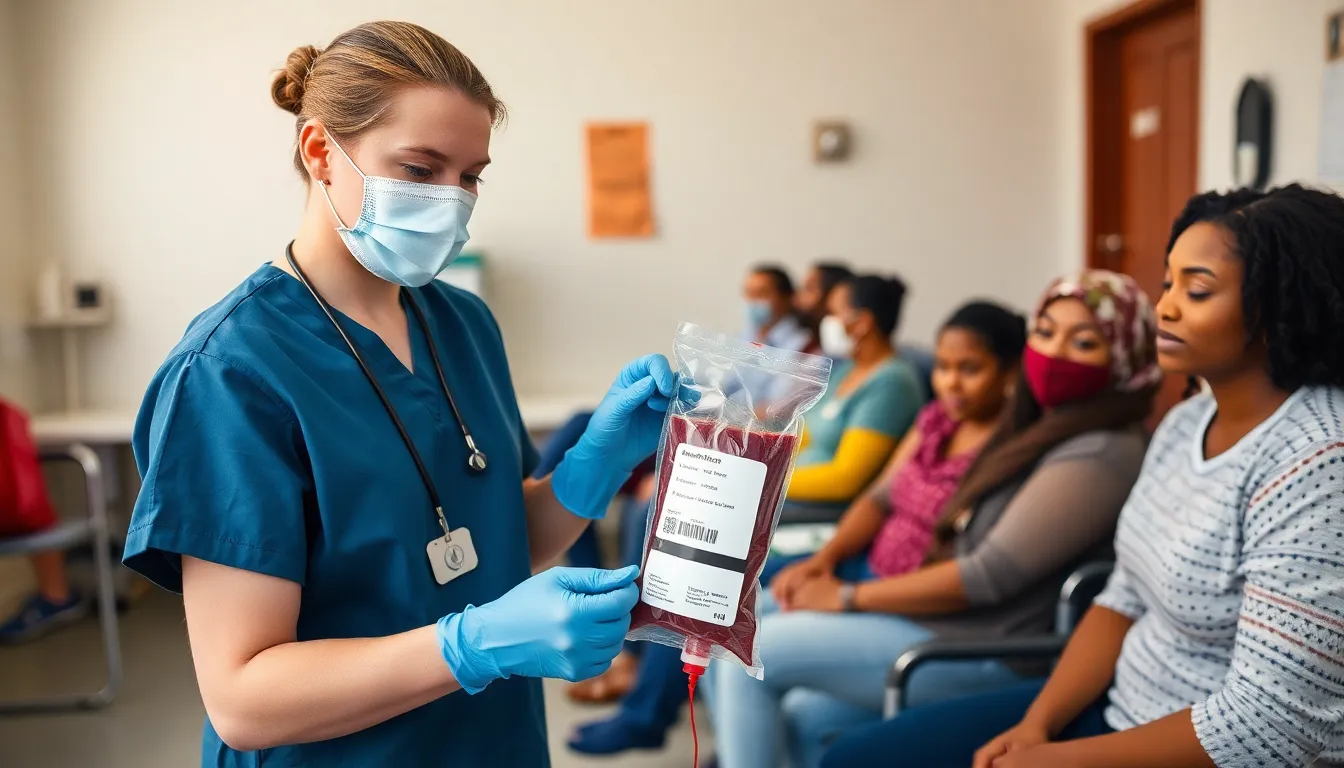Table of Contents
ToggleDonating blood is one of the most selfless acts a person can do, but not everyone gets a golden ticket to the donation chair. Picture this: you’re ready to roll up your sleeve and save lives, but wait! There are a few quirky reasons that might keep you from becoming a blood hero.
Overview of Blood Donation
Blood donation serves as a vital process for maintaining adequate blood supplies in healthcare settings. Various organizations actively collect blood from willing donors. Eligibility for donation encompasses specific criteria, ensuring the safety of both donors and recipients.
Age plays a critical role in eligibility; donors must typically be at least 17 years old. However, some states allow 16-year-olds to donate with parental consent. Weight requirements also exist, commonly set at a minimum of 110 pounds. These measures help ensure that individuals can safely withstand the donation process.
Health requires careful consideration as well. Certain medical conditions disqualify potential donors, including HIV and hepatitis. Additionally, recent surgeries or infections can temporarily restrict eligibility. Blood pressure is evaluated too, as exceptionally high or low levels may pose risks during donation.
Travel history impacts eligibility. Individuals who have traveled to specific countries with malaria outbreaks must wait before donating. Recent tattoos or piercings also introduce potential for infection, leading to a deferral period of at least 12 months.
Medications taken can affect eligibility too. Some prescribed medications may disqualify individuals from donating, particularly those that affect blood thinning or immune responses. It’s crucial for potential donors to disclose their medical history during screening.
Lifestyle choices further influence eligibility. Engaging in high-risk activities, such as intravenous drug use, automatically disqualifies a person. Alcohol consumption close to the donation time can also result in deferral.
Awareness of these criteria ensures that blood donation remains a safe and effective way to help others in need.
Common Disqualifications

Certain criteria disqualify individuals from donating blood. These factors ensure the safety of both donors and recipients.
Medical Conditions
Existing medical conditions frequently impact eligibility. Individuals with conditions like HIV/AIDS, hepatitis, or certain cancers cannot donate blood. Heart disease or a history of heart attacks also disqualify a person. Blood disorders, including anemia or clotting disorders, may prevent donation. Chronic illnesses such as diabetes or autoimmune disorders require careful consideration. Those on treatments that affect the immune system, like chemotherapy, cannot donate as well. Overall, these medical considerations protect the integrity of the blood supply.
Recent Medications
Recent medications often influence blood donation eligibility. Some prescription drugs disqualify potential donors due to safety concerns. Anticoagulants, commonly prescribed to prevent blood clots, prevent donation until their effects have worn off. Additionally, medications for specific medical conditions, such as antibiotics, may impose waiting periods. Vaccinations also result in temporary disqualification depending on the type received. For instance, individuals vaccinated against varicella must wait four weeks before donating. Understanding these medication guidelines helps maintain a safe donation environment.
Lifestyle Factors
Certain lifestyle factors can disqualify individuals from donating blood, impacting eligibility. Awareness of these factors helps ensure safe donation practices.
Travel History
Recent travel to specific regions can lead to temporary ineligibility for blood donation. Countries with risk factors for diseases like malaria or Zika may impose restrictions. Individuals returning from these areas often face waiting periods before they can donate, varying from weeks to months. Following guidelines from the Centers for Disease Control and Prevention (CDC) ensures both donor safety and blood recipient safety. Travelers should check the latest travel advisories and understand the timelines associated with their trips.
Substance Use
Substance use, including recreational drugs and excessive alcohol consumption, can disqualify potential donors. Engaging in high-risk behaviors, such as intravenous drug use, results in immediate ineligibility. Additionally, heavy alcohol consumption within 48 hours before donation may lead to a deferral. Donors should avoid such substances to maintain their eligibility and ensure the safety of the blood supply. Refraining from these activities promotes a healthier donation environment, benefitting both donors and recipients.
Age and Weight Criteria
Age criteria dictate that individuals must be at least 17 years old to donate blood, although some states allow 16-year-olds with parental consent. Significant emphasis is placed on weight requirements, typically set at a minimum of 110 pounds. Donors weighing less than this may face disqualification.
Age and weight criteria ensure the safety of both the donor and the recipient. Donating blood takes a toll on the body, making it crucial that donors possess a healthy weight for their height. This guideline helps prevent adverse effects during donation.
Variances do exist in eligibility based on specific blood donation centers. Some facilities may implement stricter age or weight limits, ensuring adherence to safety protocols. Certification standards from organizations like the American Red Cross further standardize these requirements across the nation, reinforcing best practices.
Potential donors should verify the specific criteria at their local blood banks. Individual health status can impact these requirements, alongside body composition. Consulting with a healthcare provider may provide clarity for those unsure about their eligibility.
Taking age and weight criteria into account contributes to a safer donation environment. Compliance with these restrictions ultimately helps maintain adequate blood supplies for those in need, ensuring donations meet essential safety protocols.
Understanding what disqualifies someone from donating blood is crucial for maintaining a safe donation environment. Potential donors should be aware of the various medical and lifestyle factors that can affect their eligibility. By staying informed about these criteria individuals can ensure they contribute positively to the blood donation process when they are able.
It’s essential for those interested in donating to check with local blood donation centers for specific requirements. This proactive approach not only helps streamline the donation process but also supports the health and safety of all involved. Blood donation is a vital service and knowing the rules can empower more people to participate when they qualify.




